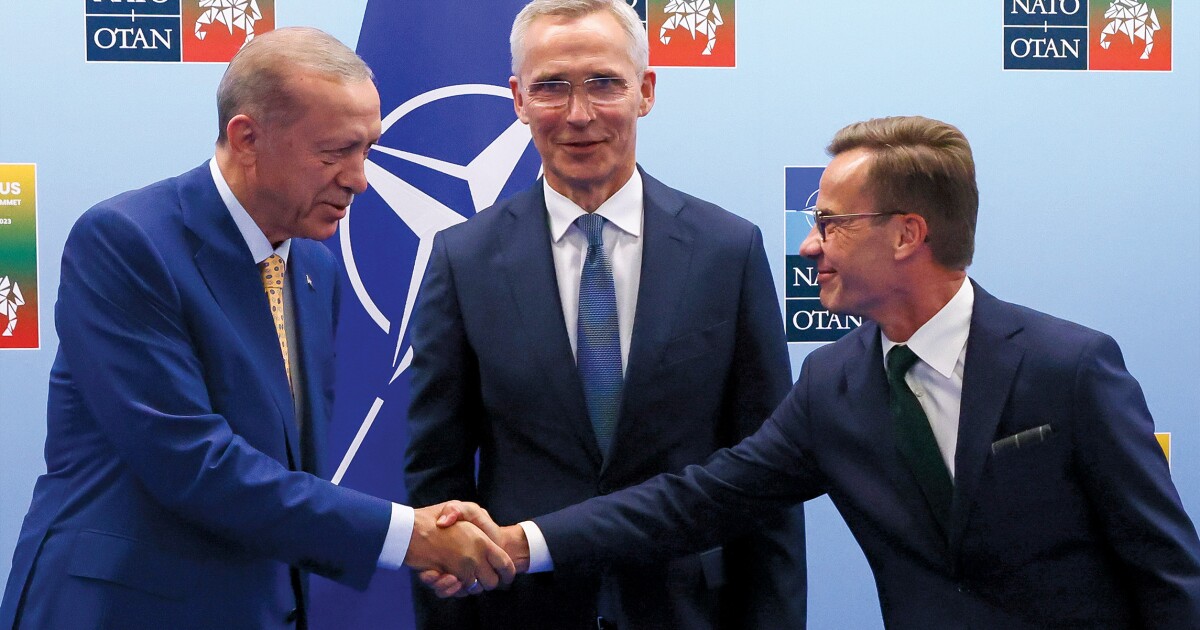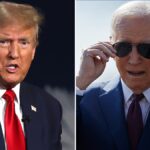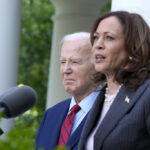

On a U.S. military flight earlier this month, a delegation of six senators was winging its way to Vilnius, Lithuania, to attend the crucial NATO leaders’ summit.
The bipartisan group included Democratic Sens. Dick Durbin (IL), Jeanne Shaheen (NH), and independent Angus King (ME), who caucuses with Democrats. Along with Republican Sens. Pete Ricketts (NE), Dan Sullivan (AK), and Thom Tillis (NC).
BIDEN TAKES NEW ACTION ON JUNK FEES, FOOD PRICES, AND CORPORATE MERGERS
Inevitably, the conversation turned to the spoiler role Turkey was playing in blocking Sweden’s bid to join NATO. Having Sweden as a member would be a big boost for the alliance and an embarrassing setback for Russian President Vladimir Putin’s stated goal of limiting NATO’s eastward expansion.
It was a “major discussion on the airplane,” King told CNN after the summit. “What is Turkey going to do?”
Much to their surprise, when the senators landed in the Lithuanian capital, they discovered Turkish President Recep Tayyip Erdogan had announced he would drop his opposition to Sweden’s accession to NATO in return for Western help to Turkey’s moribund application to join the European Union.
It was, King said, “a very important step and one that very few of us predicted.”
In recent years, longtime NATO ally Turkey, under Erdogan, has been tilting toward Moscow — most notably by purchasing, over strident U.S. objections, Russian S-400 air defense systems incompatible with NATO systems.
In 2019, under the Trump administration, the United States booted Turkey as a partner in America’s F-35 stealth fighter jet program for refusing to give up the Russian anti-aircraft systems, which, if operated near F-35s, could compromise the fifth-generation fighter jet’s stealth properties.
There was even talk about whether Turkey, a NATO member for more than 60 years, should remain in the alliance, given its increasingly cozy relationship with Putin’s Russia.
But buoyed by a narrow reelection victory last month, which solidified his already sweeping presidential powers, and seeing Russia’s military fortunes declining on the battlefields of Ukraine, Erdogan made a series of moves he had to know would not please Putin.
Early this month, he warmly welcomed Ukrainian President Volodymyr Zelensky to Turkey. And, in a surprise move, he turned over five Ukrainian commanders captured by Russia during the siege of Mariupol last year.
Kremlin spokesman Dmitry Peskov angrily accused Turkey of violating an agreement to hold on to the prisoners until the end of hostilities.
Instead, the five Azovstal defenders, as they were known, received a hero’s welcome when they returned to Kyiv.
While hosting Zelensky in Istanbul, Erdogan also voiced full support for Ukraine joining NATO as soon as the war with Russia comes to an end.
“There is no doubt that Ukraine deserves NATO membership,” he said at a news conference with Zelensky.
Then, in the run-up to the NATO summit in Vilnius, thanks in part to President Joe Biden’s promise to sell F-16s to Turkey, NATO Secretary-General Jens Stoltenberg was able to broker an agreement whereby Erdogan would lift his objections to Sweden becoming the 32nd NATO nation in return for Western help reviving Turkey’s bid to join the EU.
In an opinion essay in the Kyiv Independent, freelance journalist David Kirichenko gushed about the recent turn of events sending a message that Erdogan now sees Russia as “the sick man of Europe.”
“Turkey has made it clear that it prioritizes its status as a NATO country above all else, with its commitment to the alliance taking precedence over its relations with Russia,” he wrote.
Not so fast, countered Sinan Ciddi, a senior fellow at the Foundation for Defense of Democracies, who argued Erdogan is “just leveraging a situation to his advantage.”
“I don’t think it’s necessarily about reanchoring back to the West. It’s about leveraging policy goals that he has,” Ciddi told the Washington Examiner. “His major goal right now is basically obtaining F-16 fighter jets and a requisite number of upgrade kits for Turkey’s existing fleet because the Turkish Air Force is getting old.”
The initial euphoria at NATO when Erdogan agreed to forward the accession protocol for Sweden to Turkey’s Grand National Assembly was tempered when Erdogan said the next day that it would wait until the parliament met in October.
“He could call the Turkish parliament back into session tomorrow if he wanted,” Ciddi said. “But I think he’s not sure if Congress is going to deliver and lift its waiver of selling Turkey F-16 jets.”
Erdogan may have good reason to hedge his bets, given that Senate Foreign Relations Committee Chairman Bob Menendez (D-NJ) has said he wants Turkey to back off aggressive acts against its neighbors — in particular, Greece — before he lifts his hold on the F-16 sale.
Ciddi argued Erdogan shouldn’t be given too much credit for relenting on Sweden, which he said is “just basically doing the right thing.”
If Turkey were really realigning with the West, Ciddi argued, it would be doing a lot more, including backing tougher sanctions against Russia, divesting itself of Russian S-400 air defense systems, and joining the U.S. in the fight against the Islamic State in Syria.
But Erdogan wants to maintain his relations with Russia, which is a major trading partner with Turkey, a source of tourism, and a provider of natural gas.
“Erdogan is basically throwing an olive branch toward the West mainly because he can and simply because Putin is not necessarily in a position to do anything against him because he is in a bit of a weakened position,” Ciddi said.
CLICK HERE TO READ MORE FROM THE WASHINGTON EXAMINER
“Erdogan will continue to use this position to leverage policy goals out of Washington … and he will also leverage his relationship with Russia,” he said. “It’s not either/or. It’s basically leveraging both to the extent that he can for his own material gains.”
Or, as King put it, “Erdogan is a transactional kind of guy.”





